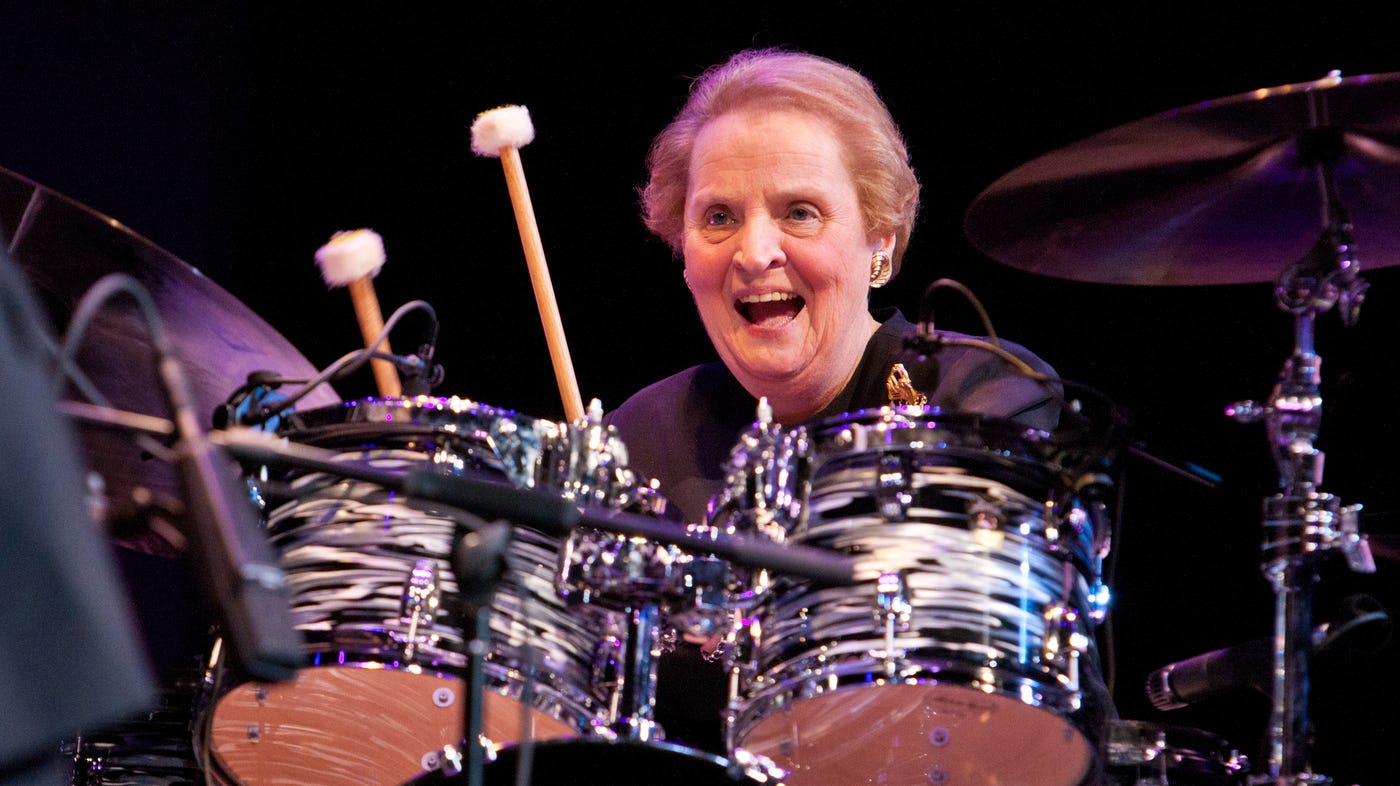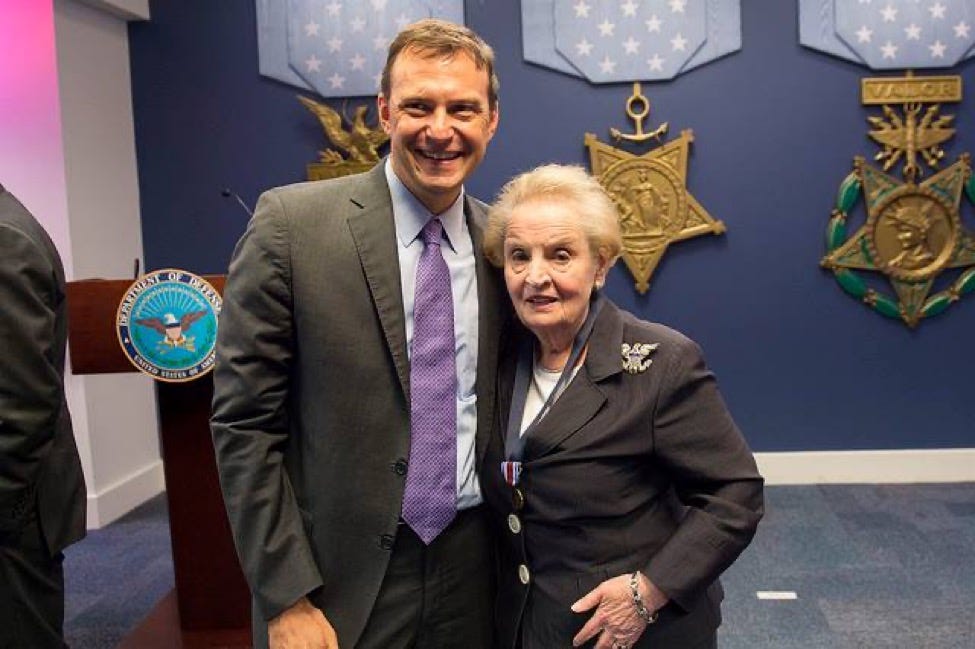Madeleine Albright’s ideals will endure
4 ingredients in Secretary Albright's "secret sauce" for making the world a better place
“Heartbroken about Madeleine.” That was the text I received from a friend of mine late Wednesday night while I was in another time zone on a work trip.
This person knew former U.S. Secretary of State Madeleine Albright much better and for much longer than I did. But we both traveled in the same circles at the intersection foreign policy and Democratic politics where Albright was the indispensable ringleader. The moment hit us hard like it did so many others around the world. An era continues to draw to a close as it always inevitably does, when one generation passes on and we reflect on the legacy left behind.
Thousands had been in the policy and political trenches with her for decades, and Albright had a deep set of connections across the globe from her time as a professor, mentor, America’s top diplomat, author, and business leader. In Albright’s solar system, I orbited somewhere out between Jupiter and Saturn. But from my vantage point, Albright’s star had a bright intensity that clarified a lot about the world, America, and what mattered most.
Tributes are rolling in with the official readouts on her life. These highlight the history she made as the first woman to serve as U.S. secretary of state, all of her accomplishments on her trajectory into that office, and all the good she did in the world after she retired from public service. They mention her wit, kindness, and warm spirit.
But as I read these, I’m left thinking about my personal engagements with her over the past decade and a half and how she would respond to this moment. In all of the discussions and meetings I’ve been in with her, she often drew the conversation to a close with a level-headed but never dispassionate question: “Now, what are we all going to do about this?”
In my imagination, if Madeleine Albright could be here at this moment just after her passing, she’d look at the grief and sadness and engage in it with us. But ultimately, she’d get down to brass tacks and ask, “So, what are you all going to do about this now?”
We will share memories and honor her historic contributions over the coming weeks. But to me, the best way to honor her memory is to figure out pretty quickly how we can ensure that her ideals take root in our lives and the world. That’s what she’d want us to do.
If Madeleine Albright had a secret sauce for getting things done and trying to make the world a better place, here are four key ingredients I saw in how she lived her life and interacted with people:
1. Bring people together to get things done.
Secretary Albright brought people together regularly to share different perspectives and come up with practical solutions, often over a meal at her home in Georgetown. The act of breaking bread while discussing big issues helped drawn people together into a stronger sense of community, something these days that sometimes feels like it’s in short supply, especially after a couple of years of pandemic isolation and Zoom interactions.
She hosted a regular dinner of mostly Democratic foreign policy and political types that ranged from current and former cabinet officials and Senators to less distinguished people like me.
Like the movie “Fight Club,” everyone observed the first rule of Fight Club (“you don’t talk about Fight Club.”) I’m bending the rules by mentioning these dinners, but I’ll never share who attended and spoke or what was discussed. The important point here was how Secretary Albright operated as the maestro who drew people together in ways that made them feel like they belonged and that their views mattered. The way she did it generated a discussion that was unique and distinctive from other gatherings held in the Beltway.
Unlike Fight Club, no punches were thrown. On the contrary, differences of views were shared with respect and candor. It sometimes became the only place where people who should’ve already been coordinating or talking through issues together finally did so.
One other great thing about Madeleine Albright was that she worked across party lines with other luminaries such as Henry Kissinger, Steve Hadley, and other former Republican national security leaders. This increasingly has become countercultural in divisive, partisan times. The tenor and style of that work mattered as much as the substance – it modeled the important behavior that people can disagree without being disagreeable, a lost art in this town.
The action item for all of us? Bring people together for practical yet capacious discussions, ones that are inclusive and roomy enough for a wide range of views but end up deciding to do something. Let’s hope someone picks up the mantle of organizing similar discussions, preferably over meals, that build relationship capital and trust, something that is in short supply these days in America and the world.
2. Listen to others and ask smart questions
The way Madeleine Albright ran a meeting like those dinner discussions had this magical alchemy that said a lot about how she operated in the world. She’d often tee up those conversations with a general framing of what’s at stake and why it mattered, and then she’d let it run with a couple of focused questions, first answered by featured speakers. Then she’d listen carefully and guide the discussion based on the interventions, using her grace and good humor to lift people and their ideas up.
It seems so basic and elemental, but it’s a worthy reminder of this lost art of discourse and dialectic in an era when so many people talk over each other on cable infotainment programs or are captured as viewers by that noise.
It takes a wise, seasoned person who has the confidence and courage of her own convictions to sit back and carefully watch where the conversation flow goes, intervening sparingly in a way that almost always made the sum greater than the individual parts. She didn’t dominate the conversation when she easily could have given her experience and stature – and she let you know the important things she had to say, usually toward the end, when the conversation turned to what we should do.
The action item for all of us? Listen to others more, and lift up voices who aren’t usually part of the conversation. Possess enough courage in your own convictions to have someone else challenge them and seek a way to synthesize those different views.
3. Maintain a boundless and fierce commitment to freedom and democracy.
So much has been written about her own strong commitment to freedom and democracy in the tributes that it’s ok to be more precise on this point here. She started out as a refugee fleeing Nazis and Communists, and she engaged deeply in the struggle for democracy at home and abroad with a fierce determination.
Her commitment to democracy and freedom wasn’t selective and it was a core part of who she was. Albright once told an interviewer, “I so believe that we are all the same, and we want to be able to make decisions about our own lives, and the only way to do that is through democracy.”
She wrote important books on democracy and the threats to it, but she didn’t just study it. She supported efforts to promote democracy in other countries and she got out into the streets in door-knocking campaigns for candidates she supported. Albright sometimes told people later in life that one of her big regrets was not running for public office herself, but she was an active participant until her final days.
The action item for all of us? Get out and do something to support freedom and democracy. Don’t just write about it.
4. Laugh, don’t take yourself too seriously, and have fun
Everyone who knew Madeleine Albright has several stories about a joke she told or a funny thing she said. I’m mostly keeping mine to myself, but if you want to hear a few, reach out to me and maybe I’ll share a few over a drink, especially if you have a few of your own. But suffice it to say, as Albright dealt with the weightiest of issues in the world, she still made time to have fun and share that fun with others.
One of my favorite stories that’s out in the public is how Albright got into a hilarious Twitter exchange with the comedian Conan O’Brien and ended up repeatedly burning the comedian in a funny way that is textbook social media jiu-jitsu. She flipped a quip O’Brien tried to make about her. You can read the whole exchange here, but the important part to me is how she ended it: “All in good fun!”
The action item for all of us? Take time and enjoy life and a laugh with someone else.
Where do we go from here?
Earlier on the day when Madeleine Albright passed away, I was in another country and my smartphone was getting hit with a stream of news about the world. The Taliban reneged on a pledge to let girls go to school in Afghanistan, and U.S. President Joe Biden was getting on Air Force One to Europe to coordinate with allies on Russia’s war in Ukraine.
I had been thinking that day that I hadn’t seen Secretary Albright in a while and I was wondering what she’d say about these events and how insightful and comforting it would be if she gathered us together as a group to talk things through. It had been many months since she hosted one of her 34th Street Group gatherings over Zoom.
And then I got the news saying she was no longer with us.
America and the world are going through several threshold moments at the same time, and the times in these liminal spaces can be confusing. Our natural instinct is to turn to wise elders, the ones who have been our anchors for years, and ask them for guidance. And when you wake up and realize that one of those steadfast anchors is no longer with us, it feels doubly disconcerting.
But then I started to think what Madeleine Albright would react: she’d gather us all together, warmly greet us with a smile and a meal, and then ask the essential question:
Now what are we going to do about this situation?




